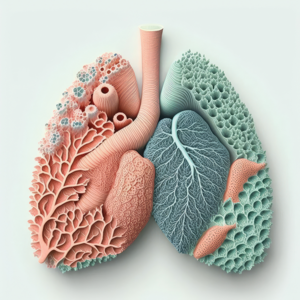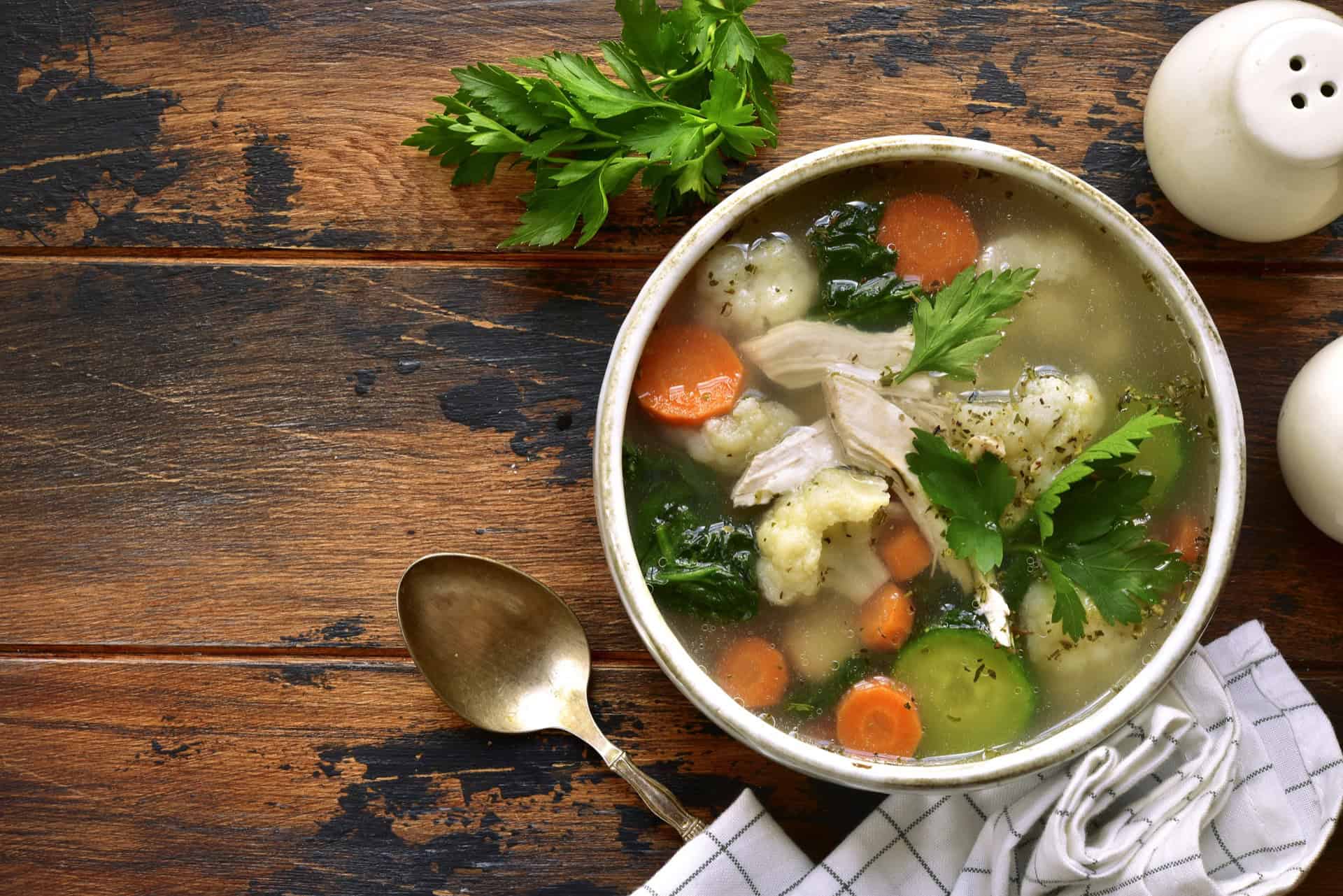 Research has been showing that the development and management of chronic respiratory diseases, such as chronic obstructive pulmonary disease (COPD) and asthma, are influenced by dietary intake.1–5 COPD and asthma are both characterized by inflammation and obstruction of the airways, systemic inflammation, and decreased lung function. A high intake of fresh fruits and vegetables, whole grains, nuts and seeds, and fatty fish provides the body with many anti-inflammatory and antioxidant nutrients and micronutrients to prevent or manage respiratory disease. The following food types can help reduce inflammation in the body:
Research has been showing that the development and management of chronic respiratory diseases, such as chronic obstructive pulmonary disease (COPD) and asthma, are influenced by dietary intake.1–5 COPD and asthma are both characterized by inflammation and obstruction of the airways, systemic inflammation, and decreased lung function. A high intake of fresh fruits and vegetables, whole grains, nuts and seeds, and fatty fish provides the body with many anti-inflammatory and antioxidant nutrients and micronutrients to prevent or manage respiratory disease. The following food types can help reduce inflammation in the body:
Omega-3 fatty acids. Omega-3 fatty acids are essential to our overall health, helping to form cell membranes and cell receptors throughout the body. They play a critical role in making hormones that regulate blood clotting, contraction and relaxation of arterial walls, and inflammation. Sources of omega-3 fatty acids include fatty fish (e.g., salmon); vegetable oils (e.g., olive oil), nuts (especially walnuts), flax seeds, flaxseed oil, and leafy vegetables.6
Vitamin C. With its powerful antioxidant and anti-inflammatory properties, vitamin C plays an important role in the immune system, helping the body fight infection, heal wounds, and neutralize free radicals. Vitamin C is also needed to make collagen, several hormones, and chemical messengers, as well as help the body absorb non-heme iron. Fruits and vegetables are the biggest source of dietary vitamin C, such as citrus, bell peppers, tomatoes, strawberries, and cruciferous vegetables (e.g., broccoli, Brussels sprouts).7
Polyphenols. Polyphenols (e.g., phenolic acid, flavonoids) are reducing agents with antioxidant properties that help protect the body’s tissues against oxidative stress and inflammation and associated diseases, such as cancers, coronary heart disease, and respiratory disease. Most plant-based foods contain polyphenols, but good sources include berries, dried herbs and spices, cocoa powder, nuts, flaxseeds, artichoke, red onion, spinach, olives, and coffee and tea.8
Foods that promote gut health. Higher intake of animal foods, processed foods, alcohol, and sugar is associated with a gut microbial environment characteristic of inflammation, whereas higher intake of fruits and vegetables have the opposite effect.9 A healthy gut microbiome can benefit the body in many ways, one of which is helping to regulate inflammation.10 All fruits and contain soluble and insoluble dietary fiber; however, soluble fiber is more easily metabolized by gut bacteria.10 Black beans, Lima beans, kidney beans, asparagus, Jerusalem artichoke, sweet potato, pears, figs, apricots, and flax seeds are examples of plant-based foods high in soluble fiber.
Sources
1. Berthon BS, Wood LG. Nutrition and respiratory health–feature review. Nutrients. 2015;7(3):1618-43.
2. Nurmatov U, Devereux G, Sheikh A. Nutrients and foods for the primary prevention of asthma and allergy: systematic review and meta-analysis. J Allergy Clin Immunol. 2011;127(3):724-33.e1-30.
3. Varraso R, Fung TT, Barr RG, et al. Prospective study of dietary patterns and chronic obstructive pulmonary disease among US women. Am J Clin Nutr. 2007;86(2):488-95.
4. Shaheen SO, Jameson KA, Syddall HE, et al; Hertfordshire Cohort Study Group. The relationship of dietary patterns with adult lung function and COPD. Eur Respir J. 2010;36(2):277-84.
5. Scott HA, Jensen ME, Wood LG. Dietary interventions in asthma. Curr Pharm Des. 2014;20(6):1003-10.
6. Harvard TH Chan School of Medicine website. The nutrition source: omega-3 fatty acids—an essential contribution. https://www.hsph.harvard.edu/nutritionsource/what-should-you-eat/fats-and-cholesterol/types-of-fat/omega-3-fats/#:~:text=What%20makes%20omega%2D3%20fats,of%20artery%20walls%2C%20and%20inflammation. Accessed 9 May 2023.
7. Harvard TH Chan School of Medicine website. The nutrition source: vitamin C. Mar 2023. https://www.hsph.harvard.edu/nutritionsource/vitamin-c/. Accessed 9 May 2023.
8. Nourish by WebMDwebsite. Health foods high in polyphenols. 23 Nov 2022. https://www.webmd.com/diet/foods-high-in-polyphenols. Accessed 9 May 2023.
9. Bolte LA, Vich Vila A, Imhann F, et al. Long-term dietary patterns are associated with pro- inflammatory and anti- inflammatory features of the gut microbiome. Gut 2021;70:1287–1298.
10. Guan ZW, Yu EZ, Feng Q. Soluble dietary fiber, one of the most important nutrients for the gut microbiota. Molecules. 2021;26(22):6802.




